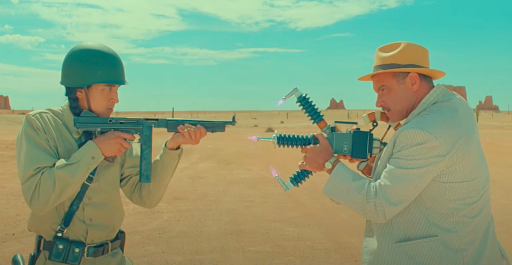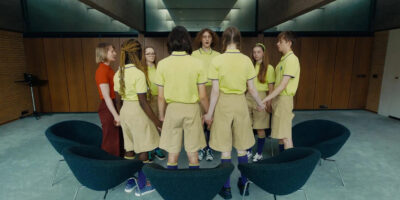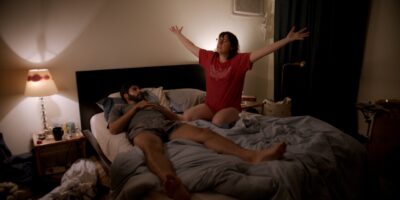The experience of watching ASTEROID CITY is best compared to re-engulfing yourself in a favorite children’s book. The details of its deceptively simple images are much more intricate than they first appeared, which evokes both a dazzling feeling and a comforting one. The film dips its toes in darkness, but of course everything turns out alright in the end, as in a storybook. The characters are artificial; the misunderstood movie star (Scarlett Johansson), the widowed war photographer (Jason Schwartzman), their respective brainiac children, and everyone else in between. ASTEROID CITY has become infamous for its immense cast of talented stars; in addition to Johansson and Schwartzman, the cast includes Tom Hanks, Jeffrey Wright, Tilda Swinton, Bryan Cranston, Steve Carrell, Rupert Friend, Maya Hawke (the standout performance for me), Matt Dillon, Hong Chau, Willem Dafoe, and a short cameo from Margot Robbie.
The artifice is the point: what the marketing team hasn’t told you is that ASTEROID CITY is a film about a play called “Asteroid City,” written by Conrad Earp (Edward Norton) and directed by Schubert Green (Adrien Brody), who experience their own creative scuffles throughout the film. Revisiting the frame story format to explore the nature of storytelling as he did in THE GRAND BUDAPEST HOTEL, Anderson takes every opportunity to remind us that this is all a show; there are strings being pulled behind the curtain, and you should pay attention to them.

What separates ASTEROID CITY from the rest of the Anderson oeuvre is its ambitious blending of western, sci-fi, romance, drama, and comedy. Anderson has previously made westerns (MOONRISE KINGDOM), family dramas (THE ROYAL TENENBAUMS), and historical epics (THE GRAND BUDAPEST HOTEL), but this is his first foray into sci-fi: unsurprisingly, these novel elements are well handled and well balanced. The alien, once revealed, is as adorable as the child actors, and very quintessentially “Wes.” The romance between the movie star and the war photographer is touching and believable, never overly melodramatic. None of the genres overpower each other, they all play their individual parts to create a well balanced whole.
Wes Anderson is one of the top American film directors working today because his films stylishly entertain and soothe, while maintaining the aura of an “alternative” filmmaker (despite the fact that THE FRENCH DISPATCH made over $46 million). If you are looking for a return to a messy, raw humanity seen in Anderson’s earlier films (THE DARJEELING LIMITED, BOTTLE ROCKET, THE ROYAL TENENBAUMS, RUSHMORE), you won’t find it in ASTEROID CITY—we haven’t seen it in his work in approximately a decade, and probably won’t again. Those films are deep dives into the psyches of fucked up weirdos, and how they hurt the other fucked up weirdos around them, even with good intentions. Anderson was interested in people, and expressed that interest through his unique visual style. Now he is more interested in artifice; we never spend enough time with one character or another to truly get inside their head.
If you are looking to be thoroughly entertained, ASTEROID CITY is a wonderful delight. If they made an Asteroid City theme park, I wouldn’t be too surprised.














Comments